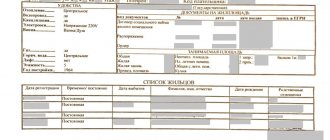Basic concepts and legislative framework
When talking about registering real estate for a child, you need to take into account the age distinction in law:
- According to Article 28 of the Civil Code of the Russian Federation - minors, that is, under 14 years of age.
- According to Article 26 of the Civil Code of the Russian Federation - minors, aged from 14 to 18 years.
Based on this, the rights of the child are formed. If we are talking about a minor, then he is incompetent and does not have the right to perform any operations. This is done for him by his legal representatives - parents, guardians, adoptive parents.
If the child is a minor, then he already has limited legal capacity - he has the right to sign documents with the permission of his official representative. If there is no official consent of the parent, then such a transaction will be considered void.
As for the legislative framework, issues of registering housing for a minor child are regulated by the following regulations:
- Article 35 of the Constitution of the Russian Federation – the right of a citizen to own property.
- Article 17 of the Civil Code of the Russian Federation - the above right applies to all citizens, regardless of age, gender, nationality.
- Article 128 of the Civil Code of the Russian Federation – the right to own any property that is not prohibited by law.
- Article 131 of the Civil Code of the Russian Federation - it is necessary to register ownership of real estate.
- Federal Law No. 122 - to register property rights, you must provide the package of documents established by the same Federal Law.
Please note that in the purchase and sale agreement, a minor will be indicated as the buyer, but with the note “In the person of (full name of his legal representative).”
Basic moments
It would seem, why does a minor become the owner of real estate? He will not remain on the street; his parents are obliged to support him financially.
In fact, the reasons why the apartment is transferred to the child are quite banal:
- Parents want to protect property. For example, if there is a risk that the apartment may be alienated by the bank for debts.
- The issue of division of property during a divorce - such real estate cannot be divided because it is not owned by the spouse (formally) and cannot be alienated or sold - the guardianship authority simply will not give permission for this and there are no grounds for such operations at all.
- Confidence in providing for their child - parents will be confident that under any life circumstances their child will not be left on the street.
It goes without saying that we have given common reasons for this decision; in fact, there are more of them.
In any case, according to Article 35 of the Constitution of the Russian Federation, a citizen receives the right to his own property from birth. The same thing is said in Article 17 of the Civil Code of the Russian Federation - civil rights, including property rights, are equal for everyone, regardless of age. This means that a minor can become the owner of real estate from birth. BUT - due to his age, or rather limited legal capacity, he cannot independently dispose of it as he pleases.
How can I apply?
So is it possible to register an apartment for a minor child and how to do it? Such transactions are completely legal, so there is no need to look for workarounds. Registration of real estate for a child is possible in several ways:
- By completing a standard purchase and sale transaction.
- Through privatization for a minor child - a share or the entire apartment.
- By drawing up a gift agreement.
- According to the will, but this cannot be called a full transfer of the object for the use of a minor.
The process of registering real estate for a child is considered separately if the property is under mortgage.
Please note that if an apartment is purchased using maternity capital, the child will in any case be the owner - the entire property or part.
General list of documents
The basic package of documents includes the following:
- Child's birth certificate or passport - depending on age.
- Title documents for the apartment.
- Cadastral and technical passport for real estate.
- Title documents for the property.
- Extract from the house register about the composition of the family.
- Certificate of absence of encumbrances on the apartment.
- Documents that confirm the authority of the child's official representative.
Registration of a purchase and sale transaction
This option for purchasing an apartment for a child is no different from the standard contract. Also, as in all other cases of purchasing real estate, you must subsequently register ownership in Rosreestr.
You need to have the following package of documents with you:
- Application for registration of property rights - if this is a minor child, then his parents sign it, if a minor - independently.
- The sales contract itself.
- Child's passport or birth certificate - depending on age.
- Passports of parents or persons who officially replace them.
- Cadastral passport and technical passport.
- A certificate stating that there are no financial encumbrances on the property.
If the child is adopted, then you must additionally provide the appropriate court order and documents from the guardianship and trusteeship authority. In general, the list of documents may change depending on the circumstances of the case, so it is better to first clarify the information with Rosreestr or the territorial branch of the MFC.
A few words about taxation
In the case of purchasing real estate for children, a citizen has the right to take advantage of a tax deduction - 13% personal income tax, maximum amount of 2 million rubles, but this does not apply to properties that are purchased with a mortgage.
Donation
Similar to what was described above - it is carried out as in the case of an adult capable person:
- The gift agreement must be certified by a notary.
- After signing the contract, Rosreestr needs to re-register ownership.
- The recipient must agree to accept the apartment. If this is a young child, then the parents sign for him, if he is a minor, then he himself, but with the official consent of the parents.
Please note that if the property has several owners, it is imperative to have their consent to carry out such a procedure. Otherwise, the parties may subsequently challenge the transaction in court.
In both the first and second cases, the child will be able to completely dispose of the apartment at his own discretion only upon reaching adulthood. Until this moment, the apartment will be managed by his legal representatives, but in this case, the guardianship authority will also take an active part - it is within its competence to ensure that the rights of a minor citizen are not violated.
By will
In this case, the transfer of real estate to the property of a minor citizen is carried out after the testator dies, and from a legal point of view, the will comes into force. But, you need to take into account the following:
- Before reaching the age of majority, the heir cannot independently dispose of the property - only under the jurisdiction of his legal representatives.
- If the child is not a first-line heir, then one should not forget about the heirs, who will definitely receive their share.
- The testator does not have to be related to the heir.
After the will comes into force, the official representatives of the heir need to formalize the entry into the inheritance within 6 months from the date of death of the testator. Further disposal of property is carried out in the standard legally established manner.
Through privatization
Step-by-step instructions for registering real estate for a child are as follows:
- A package of documents for privatization is being prepared.
- Parents or other homeowners write a refusal to privatize. If this does not happen, in the future the remaining owners can easily challenge the privatization in court.
- The package of documents is submitted to the municipality.
- If the municipality issues a permit, privatization is registered in the name of the child.
If all residents of the apartment do not write a refusal to privatize, the child can become the owner of the share.
Detailed material on how to privatize an apartment for a minor child is here https://estatelegal.ru/oformlenie/mozhno-li-privatizirovat-kvartiry-na-nesovershennoletnego-rebenka/.
Advantages and disadvantages
Drawing up title documentation for an apartment for a child has its advantages:
- The child is guaranteed to become the owner of the square meters, which serves as a guarantee of material stability and moral peace of mind for the parents.
- The legislator does not allow the alienation of a child’s property until he reaches the age at which he himself can make an appropriate decision. Consequently, disagreements in the family or financial difficulties will bypass the property.
- Children's property is not subject to division in a divorce. The apartment cannot be seized or foreclosed as part of the fulfillment of the obligations of the parents.
- An apartment can serve as a source of passive income. Until the child reaches adulthood, it can be rented out.
- Such real estate objects are under the control, including of the guardianship and trusteeship authorities, who will not give permission to conduct dubious transactions with signs of fraud. If alienation agreements were drawn up in an illegal manner, they are subject to invalidation and cancellation.
The main disadvantage is significant legislative restrictions regarding the disposal of such property. In fact, such apartments cannot be sold, since representatives of the guardianship and trusteeship authorities are the main opponents.
That is, until the child reaches adulthood, obligations for utility payments and ensuring the proper condition of the facility are assigned to the parents. From the age of 14, a minor child can already consciously limit the powers of legal representatives in relation to the property. A decision such as selling an apartment to move to another city can become a problem.
Transactions involving a minor child, and even more so the legalization of his status as an apartment owner, are associated with some legal subtleties and significant aspects. In this context, it is advisable to consult with a professional lawyer who will provide legal and practical assistance and help you not to miss the main thing.
If the apartment is under mortgage
Here the situation becomes somewhat more complicated, since three parties take part in the transaction - parents, child and bank. The bank is reluctant to enter into transactions involving a minor because:
- If the property has to be seized for non-payment of the mortgage, the minor cannot be evicted - this is prohibited by law.
- The sale of such property and any other legal transactions will be carried out only with the permission of the guardianship and trusteeship authority - it monitors compliance with the rights of the child.
- It will be much more difficult for the bank to sell the mortgaged apartment - this requires permission from the guardianship and trusteeship authority, and it is difficult to obtain.
Actually, the parents themselves will also not be able to carry out a legal transaction with such an apartment without the permission of the guardianship and trusteeship authority.
Donating an apartment to a minor
A minor can receive real estate as a gift either from family members or from third parties. But he has no right to act as a donor until he turns 14 years old.
If the apartment was received as a gift from a close relative - parents, grandparents, sisters or brothers - it will not be subject to tax. For real estate donated by other relatives or third parties, a tax of 13% of the value of the gift must be paid. However, since minors usually do not have their own funds for this, the tax burden falls on their parents.
If for any reason the parents are against the child becoming the owner of the donated apartment, the consent of the guardianship authorities will be required to refuse the gift. In this case, they will need to be convinced that the gift is detrimental to the interests of the minor.
What difficulties might arise?
A minor apartment owner is still somewhat different from an adult in terms of legislation:
- Any real estate transaction requires permission from the guardianship and trusteeship authority.
- When selling a home, you will need to provide to the same guardianship authority that the child will have a similar living space - both in size, estimated value, and sanitary standards.
- If a child is recognized as legally competent before reaching the age of majority, he becomes a full owner of the home.
Registration of an apartment for a child during privatization
The housing privatization procedure allows you to indicate the owners who will own the living space. The apartment is divided among all persons indicated in the application in equal shares. Persons registered in the apartment, at their own request, can renounce their share in favor of another person. If all family members renounce their share, the child will become the sole owner of the apartment. Otherwise, he will own a share proportional to the number of privatization participants.
If a child is registered in an apartment and the parents have begun the privatization process, they do not have the right to exclude the minor from the list of future owners at their own request. It is also illegal to deregister children before privatization in order to deprive them of their property rights.









